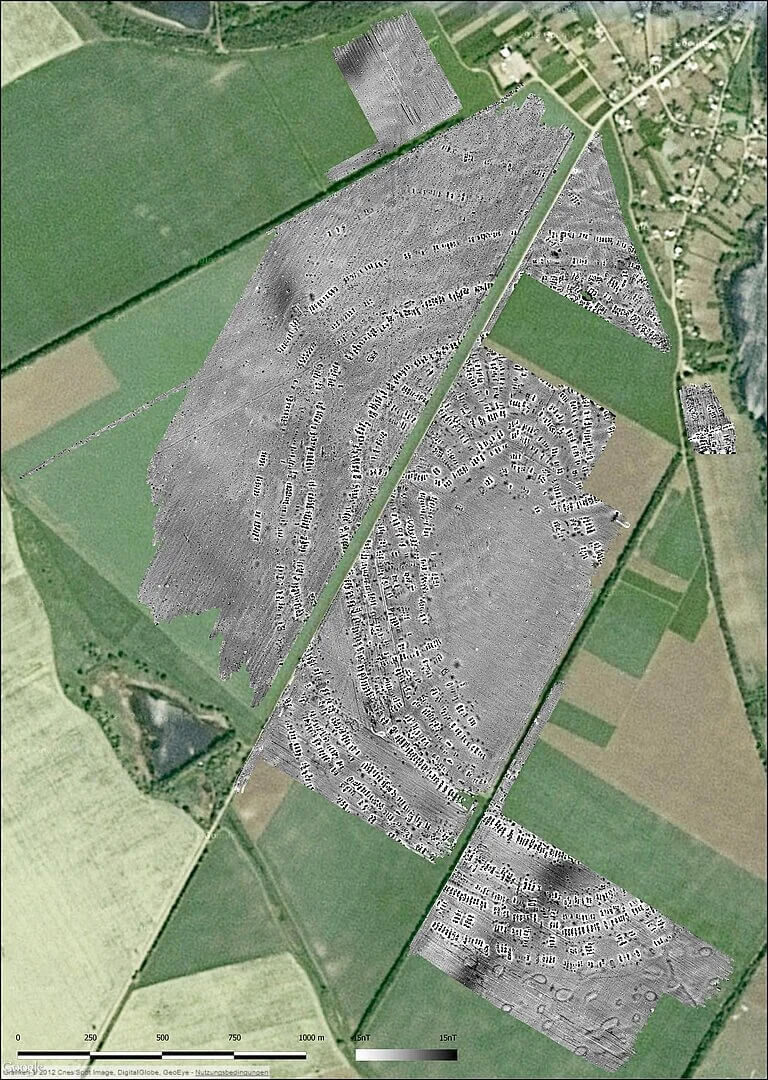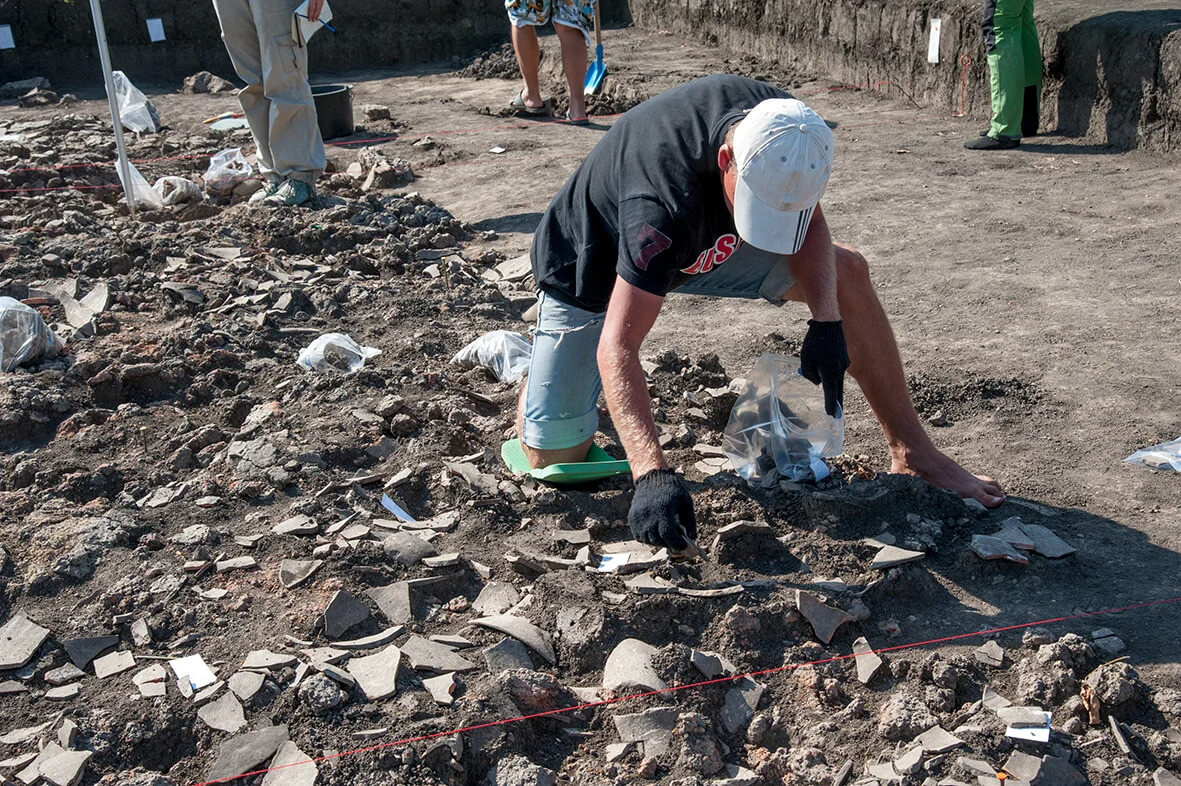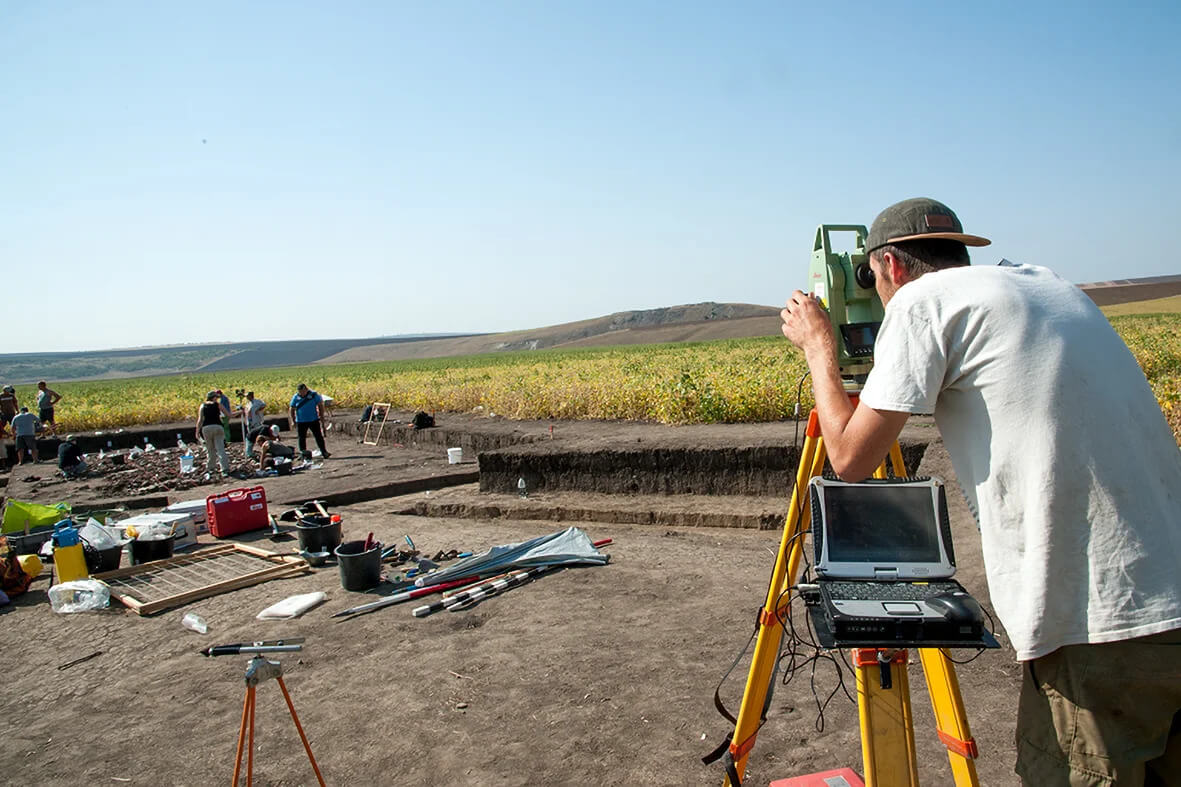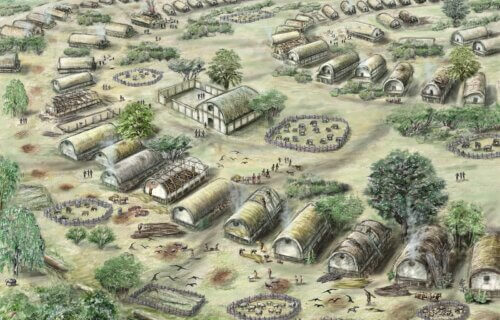KIEL, Germany — Being a vegetarian was in vogue thousands of years ago in Europe. Researchers from Kiel University in Germany are revealing that settlers in European cities 6,000 years ago were mainly vegetarians, despite keeping plenty of livestock around. It turns out those animals had one primary job — fertilize crops.
Located in what is now Moldova and Ukraine, these mega-sites of ancient Trypillia societies were once the world’s largest settlements, housing up to 15,000 people. Researchers believe these Trypillia societies were Europe’s earliest urban settlements.

Previously, the food supply of these settlements posed numerous questions to scientists. Simply put, were cattle a source of meat or a source of manure?
“The provisioning of the residents of the mega-sites was based on extremely sophisticated food and pasture management,” says study author Dr. Frank Schlütz, a paleoecologist at Kiel University’s Collaborative Research Center (CRC) 1266, in a university release.

Contrary to the historical overestimation of spinach’s nutritional value (popularized by the fictional character Popeye), the study reveals peas as a surprisingly significant source of protein in early agriculture. The Trypillia farmers, dating back almost 7,000 years, relied heavily on a diet of grains and peas, minimizing their meat consumption.
These Trypillia societies, which emerged around 4800 BCE, were not only agriculturally advanced but also known for their impressively planned mega-sites. These settlements, some covering up to 320 hectares, were meticulously organized into neighborhoods with communal meeting houses, promoting social integration and decision-making.

To understand how these large populations sustained themselves, Kiel University researchers analyzed carbon and nitrogen isotopes from hundreds of samples, including human and animal bones and charred peas and cereal grains. These analyses shed light on livestock management, crop fertilization practices, and the dietary habits of the inhabitants. The findings suggest a predominantly vegetarian diet, with peas and grains as staple foods.
“We concluded that a large proportion of the cattle and sheep were kept on fenced pastures. Moreover, the manure of the animals produced there was used by people to intensively fertilize the peas in particular,” says Schlütz.
This sustainable approach allowed the Trypillia people to maintain a nutritious and balanced diet, rich in essential amino acids, without heavily relying on meat production. These mega-sites, though, did not last, due to social inequality.
“As we know from previous studies, social tensions arose as a result of increasing social inequality. People turned their backs on large settlements and decided to live in smaller settlements again,” says study author Dr. Robert Hofmann, archaeologist at Kiel University.
Eventually, around 3000 BCE, the Trypillia societies faded away, marking the end of these early European urban settlements.
The study is published in the journal journal PNAS.
7 Health Benefits of Vegetarianism
Whether it’s for ethical, environmental, or health reasons, embracing vegetarianism can be a transformative journey for your body and mind. Here’s a look at some of the key health benefits you might enjoy as a vegetarian:
- Heart Health: Vegetarian diets are renowned for their ability to support heart health. Rich in fruits, vegetables, and whole grains, these diets are packed with essential nutrients while being low in saturated fats – a combination that helps in reducing cholesterol levels and blood pressure, thereby diminishing the risk of heart disease.
- Weight Management: Numerous studies have shown that vegetarians tend to have a lower body mass index (BMI) compared to non-vegetarians. The high fiber content in plant-based foods keeps you feeling fuller for longer, which can help in reducing overall calorie intake and supporting healthy weight management.
- Lower Cancer Risk: A diet high in fruits, vegetables, and whole grains is packed with antioxidants, vitamins, and minerals. These nutrients play a crucial role in reducing the risk of several types of cancer, particularly those related to the digestive system.
- Better Digestive Health: The abundance of fiber in a vegetarian diet not only aids in weight management but also promotes a healthy digestive system. It helps in regular bowel movements and the prevention of digestive disorders like constipation and diverticular disease.
- Reduced Risk of Type 2 Diabetes: A vegetarian diet can be beneficial in preventing and managing Type 2 diabetes. It typically has a low glycemic index, which helps in stabilizing blood sugar levels.
- Improved Mood and Mental Health: Some studies suggest a correlation between a vegetarian diet and improved mood. The absence of certain fatty acids found in meat, coupled with the high levels of antioxidants present in plant-based foods, can positively affect mental health.
- Longevity: With the reduced risk of chronic diseases and the array of nutrients that support overall health, vegetarians may enjoy a longer lifespan compared to their meat-eating counterparts.
The key to a healthy vegetarian diet is variety and balance. Ensuring you get all the necessary nutrients, such as protein, iron, calcium, and vitamin B12, through a well-planned diet, is crucial. If you’re considering this lifestyle change, it’s a good idea to consult with a nutritionist or dietitian to create a plan that meets your individual health needs.


Unfortunately, they were also misogynistic, homophobic, islamaphobic, polluters who were members of MAGA.
Lol. I doubt it, seemed rather harmonious. They prolly didn’t indulge too much in the “Systematic Fear” The reality is a lot of those things you mentioned not only stem from Judaism, but the other equally evil oppositional force Islam. Chances are this was an advancement from the shamanistic tribes of Eastern Europe.
This was OK’ed by the moderation? Hello!!!!!
Seems like they were very fortunate then. Must have been nice to live in a society like that. They probably loved and followed someone like Jesus Christ. Which would bring true love and peace to their way of life. But then I bet some homos tricked some good people into the act of abomination. Which led to inequality and persecution of the regular good conservative people that just wanted to live their life and be left alone.
Said they were from the Ukraine area, which was constantly being invaded, first from the east, then from the west, and so on and so forth for hundreds of years.
When the Flood waters subsided (due to Velikovsky’s comet) and ONLY mud was seen for thousands of miles in any direction, there was NO food, NOR any opportunities to GROW ANY for the next couple OF decades to come, what to do…..what to do? And those tracks of men’s footprints along side of dinosaurs, in hard rock deposits….hmmm.
Ah, beef cattle……
And now you KNOW the REST, of the story….
Vegetarians outlive carnivores by 15 years because we human primates have flat teeth and are rear-gut fermenter–we’re herbivores– we’re genetic engines and every meal is a medical event, wrong genetic fuel, genetic engine knock sooner or later–
yeah, i guess you are right thats why India who are mostly vegetarians have average lifespan 70.62 years. While the heaviest meat eaters in the world Hong Kong has average lifespan 85.42. But sure, stay woke and believe Netflix documentaries or big pharmas who profit from sick people like you 😀
Three modes of nature influnce everything in nature,goodness, passion an ignorance, they have very different symptons ,from lowee to higher the purpose is to have freedom of will,to facilate different desires ,good,bad an inbetween ,every living being has freedom to do as they please yet there are reactions to our actions .meat eating for example, is not incouraged for humans ,but if its wath you enjoy nature give you facility as a meat eating animal no problem,higher eating habits for refined qualities like compassion elevate you to higher celestial bodies.
This makes sense. The sustainable farming system does it … but of course now we have enough animals that we can eat meat too.
The only way to put nutrients back in the soil without all the chemical fertilizers, and then the herbicides and pesticides is to graze large animals, then follow up with chickens to eat the bugs, and then move the animals to the next pasture and plant the land again, and repeat.
Bugs are good for the environment (they break down most nutrients, knes that animals don’t for example breaking down detritus), in terms of what breaks down atmospheric compounds that will always be around as alot of life depends on them that would be plants. Plants are destroyed for modern farming that aims to sustain billions of people on “easily obtained” meat. Today we mass produce multiple animals, as more and more countries take on the modern factory farming practice introduced by the western world. Where animals live plants die, simple proof of this is where your dog goes or do a thought expirement about if you would be able to have a farm in a city. One of the benefits of herbivores in the wild is not only are they fertilizing soil, they have plant seeds they’re spreading, and their environments are also sustained by thriving plants they eat off of allowing them to be part of a natural process. They also can prevent things like forest fires as many herbivores eat branches and leaves of trees. Additives are given to livestock food, where in the wild much of their protein comes from leaves of plants. Yes fertilizer is beneficial but today its not produced in a natural way. Chemical fertilizers are harmful though. Particularly if anyone out there is using a lot of phosphorous. That gets into our water through runoff, and when we eliminate natural areas that are reservoirs of water we essentially don’t have a backup plan besides more machinery. Chickens are one of the single most mass produced animals. Variety is the spice of life everyone. Unfortunately most people can’t even imagine the amount of effort it would take to truly go back to basics and integrate nature into our lives. Most societies would rather copy the easy tried and trye model, and it isn’t sustaining much of anything here. Think about a carnivore having the intelligence to control the world’s processes. The world could be a meat farm and the carnivore could say it sustains them so it’s sustainable. Hopefully if they do have that intelligence they would tap into their ecology knowledge enough to know otherwise. There’s so much of it out there now if we really want to look, truly. But i think at this point it makes people too nervous to tbh.
#6 “improved mood and mental health”? You’re having a laugh, aren’t you? All the vegetarians are passive-aggressive and get very militant when you start questioning their propaganda. With that kind of attitude, what good is longevity (#7), even if it were true?
Well, as you go out there in the world expect small mindedness to be followed up with a lot of arguments. Blame their longevity on our biota, jaws, opposable thumbs ancestors were using a lot for gathering but then were turned towards weapons, yes but still, not weapons originally (we never had to find raw meat or herbivore poop appetizing at least); propensity for finding beauty in vibrancy, minerals helping with bodily processes like supporting our blood cells, complex intestinal system where were not basically an acid furnace like a snake, need for fiber to push the waste out, etc. The main impact of red meat over TIME sorry had to add that for personal reasons is when it’s processed by the body, the body takes a long time to process it, this in my theory causing a state where the corollary system is affected. I’ll admit this is not factual but it is factual that the corollary system is affected over time. Maybe it has to do with sustained stress on the system, maybe. Carnivores possibly dont experience this stress as much as modern day humans because if you know anything about animals you know carnivores arent grazing. Their meals are fewer and further between than meals of herbivores. The question for militant anti a certain diets is why care about something a person is doing if you already think of them as a propaghandist? Do you think a giraffe or a gorilla or even cows you benefit from are propaghandists as well? Basically, in conclusion don’t hate the player, hate the game. And if you love the game so much, get your nutrients for your optic nerve sustenance, etc from herbivore poop or organs that contain plant remains, even bones. That’s how it’s done in the wild bro. The alpha wolf gets to eat the organ delicacy. We didn’t really have to do that, then didn’t have the resources to. Again hate the game player.
This article is 100% nonsense. Ancient agricultural tribes barely scraped by on what they grew. They spent most of their day looking for food. They did not have the time to raise huge animals simply for their doo-doo.
Speaking of which, that’s what this article is. More doo-doo prop for “plant based” ill health.